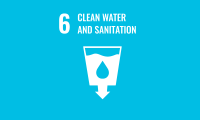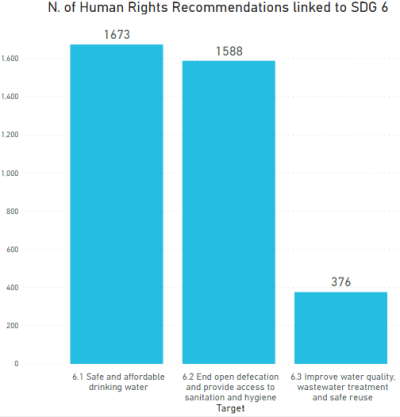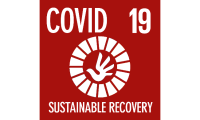SDG 6 and Sustainable Recovery

Key aspects of SDG 6:
1. Access to clean water and adequate and equitable sanitation and hygiene including through international cooperation and capacity-building support (targets 6.1, 6.2, 6.a)
Health risks, including the risk of contracting COVID-19, are exacerbated by lack of access to adequate sanitation and clean water. 3,6 billion lack safely managed sanitation services, and 1,7 billion of them do not have access to basic sanitation services and drinking water. Of the people lacking basic sanitation services 2/3 live in rural areas, with 50% of them living in Sub-Saharan Africa. 3 billion lack basic handwashing facilities and are prevented from adopting basic disease prevention and safety measures such as handwashing. COVID-19 has highlighted the critical role of adequate investment in basic water and sanitation services including through effective international cooperation and capacity-building support.
Inequality is a key consideration for the achievement of access to adequate sanitation and hygiene for all. Communities and groups subject to structural discrimination and disadvantage often lack basic amenities such as access to water and sanitation facilities, soap and sanitiser.
Women-headed households face increased health risks caused by poor access to clean water and sanitation as they are more likely to have inadequate housing. Children with disabilities and those living in humanitarian settings are often particularly deprived.
Access to clean water and sanitation has been recognized as a human right essential for the realization of the right to an adequate standard of living, the highest attainable standard of health, and the right to life and human dignity.Access to safely managed sanitation will only reach universal coverage in 2030 if the current rates of progress are quadrupled.
Sustainable response and recovery actions:
The COVID-19 pandemic has demonstrated the critical importance to disease prevention and containment of investing in and expanding access to adequate sanitation, hygiene and clean water. Even before the pandemic the lack of clean sanitation and water caused more than 800.000 people to die from diarrhoea each year.
The minimum, core human rights to water and sanitation must be guaranteed at all times and under all circumstances. This urgent need, magnified by the public health crisis, must be answered with guarantees and safeguards to fulfil the human rights to water and sanitation through policy and legal changes.
Governments should implement or reinstate the policy of prohibiting water cuts as well as cuts to other basic supplies and guarantee a minimum essential amount of water and essential basic supplies to those who face difficulties to pay for those services and supplies.
Visit the documents and resources listed in the “Key Human Rights Guidance” below for more information.
Besides the right to clean water and sanitation (recognized in UN Resolution 64/292):
International Covenant on Civil and Political Rights (ICCPR), art. 11.1: The States Parties to the present Covenant recognize the right of everyone to an adequate standard of living for himself and his family, including adequate food, clothing and housing, and to the continuous improvement of living conditions. The States Parties will take appropriate steps to ensure the realization of this right, recognizing to this effect the essential importance of international co-operation based on free consent.
Convention on the Elimination of all Forms of Discrimination Against Women (CEDAW), art. 14.2.h: States Parties shall take all appropriate measures to eliminate discrimination against women in rural areas in order to ensure, on a basis of equality of men and women, that they participate in and benefit from rural development and, in particular, shall ensure to such women the right: To enjoy adequate living conditions, particularly in relation to housing, sanitation, electricity and water supply, transport and communications.
Convention on the Rights of Persons with Disabilities (CRPD), art. 28.2.a: States Parties recognize the right of persons with disabilities to social protection and to the enjoyment of that right without discrimination on the basis of disability, and shall take appropriate steps to safeguard and promote the realization of this right, including measures: To ensure equal access by persons with disabilities to clean water services, and to ensure access to appropriate and affordable services, devices and other assistance for disability-related needs
The Convention of the Rights of the Child (CRC), art. 24.2.c: States Parties shall pursue full implementation of this right and, in particular, shall take appropriate measures: (c) To combat disease and malnutrition, including within the framework of primary health care, through, inter alia, the application of readily available technology and through the provision of adequate nutritious foods and clean drinking-water, taking into consideration the dangers and risks of environmental pollution;
Key Human Rights Guidance:
- Human rights and the privatization of water, Special Procedures Report, (A/75/208), 2020
- Water, sanitation, hygiene, and waste management for the COVID-19 virus, World Health Organization (WHO) and United Nations International Children's Emergency Fund (UNICEF), Interim guidance, 2020
- World Toilet Day 2020, Special Procedures, Joint Statement, 2020
- Global Hand Hygiene Campaign, World Health Organization (WHO), website
- Key messages on human rights, the environment and COVID-19, human rights at the heart of the response, The Office of the High Commissioner for Human Rights (OHCHR) and United Nations Environment Programme, 2020
- UN Guiding Principles on Human Rights and the Environment, Special Procedures, Report, 2018
- Right to water, Committee on Economic, Social and Cultural Rights (CESCR), General Comment, No. 15 (E/C.12/2002/11), 2002
- Resources and cases on water and sanitation, Danish Institute for Human Rights, website
- UN Water Coronavirus global health emergency, website
- Recommendations from human rights monitoring mechanisms linked to SDG 6 by country, Danish Institute for Human Rights, search page
- Human rights law and standards linked to SDG 6 by target, Danish Institute for Human Rights, search page

Explore all Recommendations from human rights monitoring mechanisms linked to SDG 6 by country

